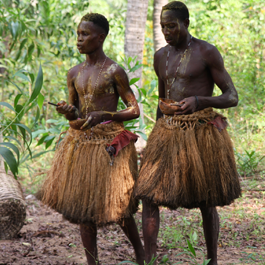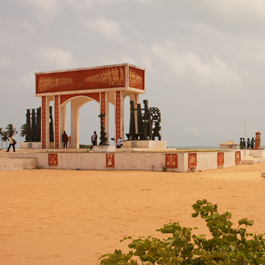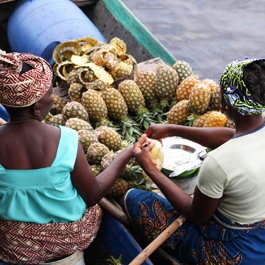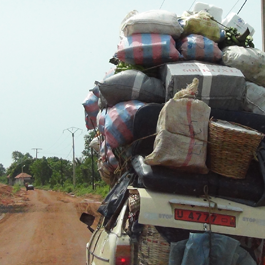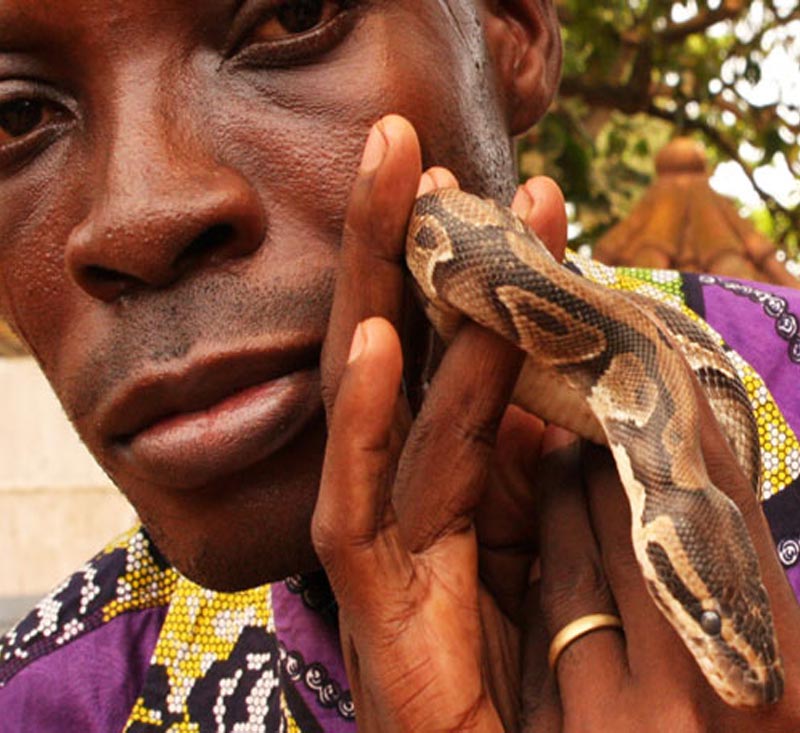
Benin’s National Day of Voodoo is one of Africa’s best festivals. Do not travel to West Africa for wildlife. Come for the history and culture.
Why choose Benin as your travel destination?
Most journeys begin in Cotonou, Benin’s largest city and de facto capital. Cotonou has an enviable location on the Atlantic Ocean with miles and miles of beach which on weekends are crowded with local families.
Cotonou’s Dantokpa Market is one of the largest in West Africa. Accessible from Cotonou on day trips are Ganvie, where 12,000 fishermen live in stilt villages on Lake Nokoue; Ouidah, a former slaving post and considered the birthplace of voodoo; and Porto Novo, Benin’s official capital, another former slave post, city-state of a Yoruba Kingdom based in Nigeria, and where many former slaves settled when they returned from Brazil after their emancipation.
Porto Novo means “New Port” in Portuguese. One of the great sights in Port Novo is the multi-colored Brazilian mosque. Another is the costumed voodoo figures with their roots in Yoruba culture known as the “Guardians of the Night.” Highly revered and serving as an unofficial police force, these spirits were originally created to scare enemies away. Today they still wander Port Novo streets before returning to their temple where entrance is prohibited.
In Northern Benin, Abomey Palace is a reminder of the powerful, Fon-speaking Dahomey Kings whose reign flourished during the 18th and 19th centuries and who were enemies of Porto-Novo’s Yoruba. Also in the north is the Atacora Mountains, where a minority of Somba people continue to live in distinctive tall castles of mud which functioned in the past to keep out intruders. Pendjari and W Regional National Parks are located in the far north of the country. Although Pendjari National Park is an exceptionally scenic park, it does not provide the wildlife experience of Eastern and Southern African parks.
A week to ten days allows you an in depth look at Benin, which would also include as far north as Natitingou and Pendjari National Park. If you want to base yourself in Cotonou and see the closer sights of Ganvie, Ouidah, Porto Novo and Abomey then consider a five day stay.
Porto Novo means “New Port” in Portuguese. One of the great sights in Port Novo is the multi-colored Brazilian mosque. Another is the costumed voodoo figures with their roots in Yoruba culture known as the “Guardians of the Night.” Highly revered and serving as an unofficial police force, these spirits were originally created to scare enemies away. Today they still wander Port Novo streets before returning to their temple where entrance is prohibited.
On January 11 every year, Benin celebrates its Voodoo Festival. One of the best places to observe the festival is in Ouidah, a town an hour’s drive from Cotonou. CNN has called this festival one of Africa’s top five festivals not to be missed. MTT advises two to three nights in Ouidah, beginning on January 10, the day preceding the festival. There are private celebrations happening in and around town and you can seek permission to attend them. Most of Ouidah’s accommodations become fully booked the night of January 11. Advance planning is essential.
Voodoo originated in Haiti during French colonial times, but its foundations are the tribal religions of West Africa which incorporated ancestor worship, singing, dancing, drumming, and spirit possession. These ancient beliefs were brought to Haiti by slaves in the seventeenth century who were captured mainly from the Dahomey Kingdom. The word ‘voodoo’ derives from the word ‘vodu’ in the Dahomey language of Fon and means “spirit.” In Haiti, the slaves created a new religion which combined West African beliefs with Haiti’s indigenous beliefs and it is this colorful mélange of ritualistic spectacles that they brought back to Africa and which forms the core of voodoo today.
MTT’s Director lived in Cotonou for two years. During this time she traveled throughout Benin and Togo. She has attended the Voodoo Festival in Ouidah twice and recommends it as one of the most authentic African festivals on the continent.
Cotonou has a diverse range of accommodations available, from the top of the line Novotel Hotel to the economical Ibis Hotel which is located next door to the Novotel. Both are within walking distance of the beach.
The Azalai Hotel, also known as Hotel de la Plage, is closer to town and is another good 3 * option. The artistically decorated Maison Rouge in the Laico Center along the water front is often full so book in advance.
Upcountry, the choice is more limited. In Natitingou there is a hotel catering to tour groups built like a Somba mud castle. In Pendjari National Park, there is the comfortable Pendjari Lodge operated by retired French doctors.
The final cost of a safari depends upon many factors: length of the safari; accommodation choice; seasonal rates for accommodation; safari vehicle rental; fuel; driver and guide expenses; local flights; airport transfers; and park, community and activity fees.
Operators which offer set departures and itineraries which don’t alter greatly throughout the year can provide safaris already priced on their websites. MTT’s specialty is bespoke safari services.
Each itinerary is personal and its cost varies. However, typically, travel in West Africa is far less expensive than travel in East, Southern and Central Africa with their focus on wildlife.
If you wish to attend some of the private ceremonies of the Voodoo Festival it is expected that you donate 30-50 USD per person to your hosts. This payment also allows you to film and photograph.
MTT LTD accepts Visa and MC credit cards, debit cards, and PayPal through its online invoicing and payment system operated by 3G Direct Pay.
